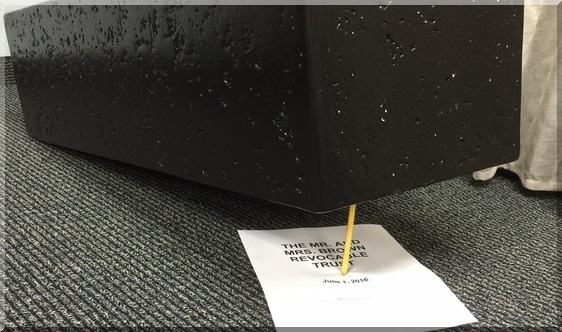
If No Contest Clause, Use a Declaratory Judgment
A No Contest Clause basically says “If anyone contests what I said in this document, they don’t get anything.” The problem with a No Contest Clause is that no one knows what a “contest” is. If the executor or trustee isn’t doing his or her job, and you file something with the court complaining about that, is that a “contest”? Well, it might be. Below is a short discussion on how to use a Petition for Declaratory Judgment to battle a No Contest Clause.
Allegations of trustee misconduct are too common from our experience. This even happens in the case of a celebrity, such as the allegations that Michael Crichton’s widow mishandled the trust. When should you use a Petition for Declaratory Judgment? Let’s say you’re dealing with Charlie Brown’s parents’ trust. It says that after Mr. and Mrs. Brown die, Charlie Brown’s younger sister, Sally, is to become the successor trustee. And let’s say that Sally is now the trustee. The trust contains a No Contest Clause. Sally is refusing to do certain things (like selling the house, providing an accounting, treating the beneficiaries equally). If Charlie goes to court and make all of these claims, and then asks that Sally be removed as trustee, Charlie could be violating the clause (because the trust named Sally to be trustee). However, Charlie could still do this and get away with it if he has “probable cause” to bring your petition. (And yes, “probable cause” is also a loosey goosey term.)
Confused yet? Read on and hopefully it will get clearer …
Charlie has two choices. First, he can roll the dice and hope he can prove his case. That’s not a good idea. Or, second, he can file a Petition for Declaratory Judgment. Assuming you go the second route, you are not actually asking for the Court to remove Sally the trustee. You are simply asking the Court to determine whether Sally has breached her duties as trustee. Here the petition would say:
WHERFORE, Petitioner requests that the Court:
- Find that Sally Brown is unwilling to act as trustee of the Trust.
- Appoint Charlie Brown as successor trustee of the Trust only if the Court finds that Sally Brown is unwilling to serve as trustee.
- Order Sally Brown to deliver all accounts, books, and records of the Trust to Charlie Brown only if the Court finds that Sally Brown is unwilling to serve as trustee.
- Grant such other and further relief the Court deem just and appropriate under the circumstances.
A really conservative approach to a Declaratory Judgment action would be to do this in two completely separate stages. First, you would ask the court to rule that if you bring an action alleging the various misdeeds of the trustee, that you would not be violating the No Contest Clause. Only after you have the Court’s blessing with that first proceeding would you file a second petition requesting that the trustee be removed. That’s the way things are done in, for example, California.
The same principle applies in the context of a Will.
If a trustee or Personal Rep is not doing his/her job, and the relevant document has a No Contest Clause, you need to see a probate litigation attorney. Do not try to do this on your own! We’re here to help. Give us a call at 602-443-4888.


